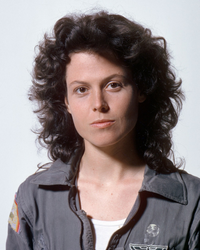In a scene in Aliens, Ripley confronts Burke (a company man assigned to the mission to keep the corporation’s financial interest in the creature quietly front and center). Ripley discovers that Burke had a part to play in the devastation that they’ve encountered on the planet, and she doesn’t hesitate to make her voice known to him—despite the consequences she might suffer should they make it out alive. Burke, a snake-oil salesman, turns into a deer in headlights as Ripley grills him about the deaths that’ve happened because of his actions. She doesn’t back down.
In a scene from Patty Jenkins’ Wonder Woman, Diana confronts Steve Trevor when she realizes that she sees the potential for darkness and destruction in him, understanding that the same potential is what she’s fighting as they engage full-scale war. It’s an incredible moment, and a revelation—both for Diana and for the audience. Diana then makes her choice, and it’s to fight. It’s what she has to do.
Ripley, in her final adventure with the Alien, as witnessed in David Fincher’s Alien 3 (1992), finds herself impossibly impregnated with an alien queen. She is given a last-minute offer to trust a familiar face who works for the Company (a company she no longer trusts): they can put her into stasis and remove the alien embryo. Ripley is faced with the notion of living out the rest of her life, or surrendering it for the good of mankind. She is faced with a choice. And like her counterpart, Wonder Woman, she chooses to fight. She falls into a vat of molten lead, ensuring a future for mankind.
It isn’t a common thing to see characters—particularly female characters written by men—who embody such unabashed integrity without being saddled with a traumatic (and oftentimes abusive) backstory. James Cameron is indeed a smart filmmaker, and equally a smart writer, but like so many of his male counterparts, he tends to believe that a good female character must be troubled in some way, or must come from some kind of heavy dysfunction and/or abuse to be believable.
James Cameron put his name on the map with The Terminator and Terminator 2: Judgement Day, before moving on to writing and directing Aliens, centering around Ellen Ripley. Ripley had no hesitation when it came to choosing, knowing and doing what was right, in her eyes. Ripley began her life as an ordinary person, then was thrust into extraordinary circumstance, relying on her instincts to navigate through some of the worst darkness one could experience. By the second film, she’s leading a band of marine misfits out of harm’s way. Ripley has more in common with Wonder Woman than James Cameron realizes.
In an interview with The Hollywood Reporter, Cameron is quoted as saying,
“All of the self-congratulatory back-patting Hollywood’s been doing over Wonder Woman has been so misguided," he said in an interview with The Guardian. "She’s an objectified icon, and it’s just male Hollywood doing the same old thing! I’m not saying I didn’t like the movie but, to me, it’s a step backwards."
"Sarah Connor was not a beauty icon," Cameron said. "She was strong, she was troubled, she was a terrible mother, and she earned the respect of the audience through pure grit. And to me, [the benefit of characters like Sarah] is so obvious. I mean, half the audience is female!”
Unlike Wonder Woman, Ripley isn’t a demigod; she’s a regular person trying to make the best choices in terrifying situations. Like Wonder Woman, Ripley is a beautiful woman, not troubled, not a bad mother, surrounded by a growing nightmare. In Cameron’s film, Ripley has to make a choice: let a platoon of marines die fighting an onslaught of aliens that have ambushed them in a processing station, or take charge and rescue them. When we meet Ripley in Aliens, she’s the lone survivor of a doomed mission (Alien, 1979). Her nightmares about that mission haunt her steps. And then she finds herself again in the middle of an infestation, back on the planet she narrowly escaped from in her first adventure.
Wonder Woman, by comparison, had a much easier life. Diana Prince grew up on a magical island, born from the love of Zeus and her Amazonian mother, on the mythical isle of Themyscira, full of strong and brave women.
Both Ripley and Diana, in their own ways, pivot from a similar place by way of their integrity. Their instincts tell them both what is unequivocally right. They can to see the darkness in good men and the light in dark men. James Cameron’s criticism of Wonder Woman is curious, because there is so much of Wonder Woman in Ripley: so much goodness, unbridled goodness, and a fervor to do the right thing—no matter what the men around her are telling her.
Cameron wrote and directed Ellen Ripley in her most famous incarnation to date. She hadn’t been abused or beaten, troubled or traumatized (except for her experience in the first film). Ripley was good and true, because she was good and true. Her experiences didn’t form her core character; her character had always been thus. Cameron developed her that way. We live in a world where women’s experiences have been framed and constructed by men throughout recorded history. They’ve always been in charge.
It’s time we shut up and listen. There is much we could learn.
JM Prater
Founder and Co-host
Perfect Organism: The Alien Saga Podcast
Shoulder of Orion: The Blade Runner Podcast





